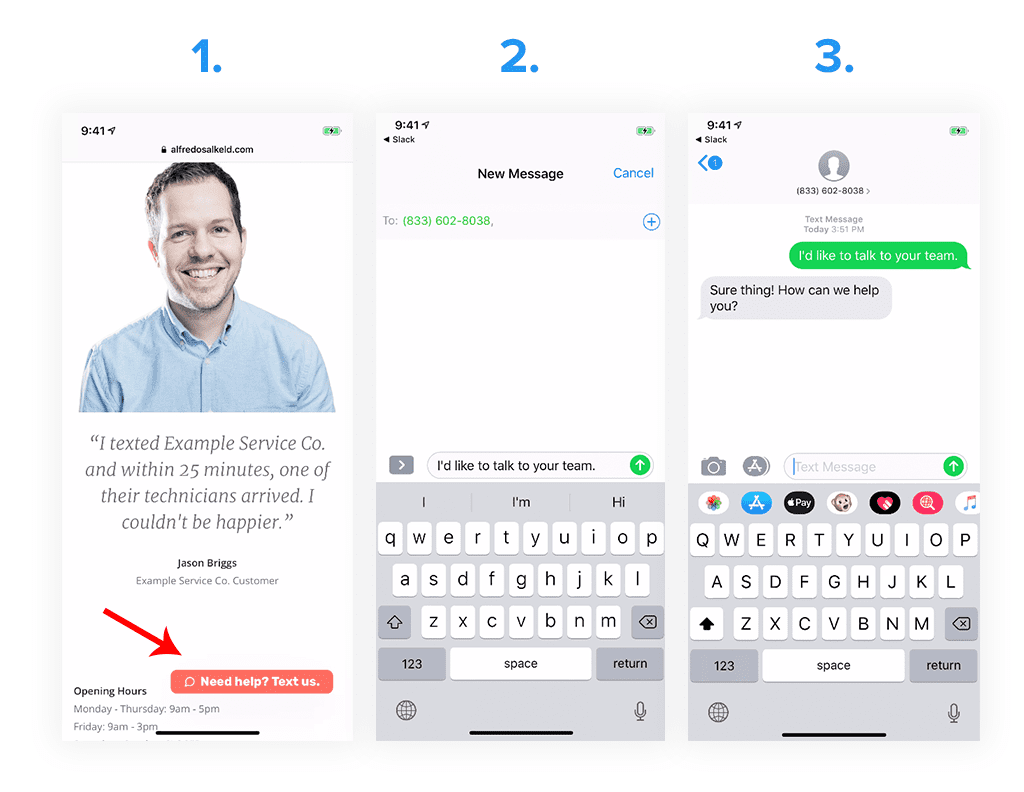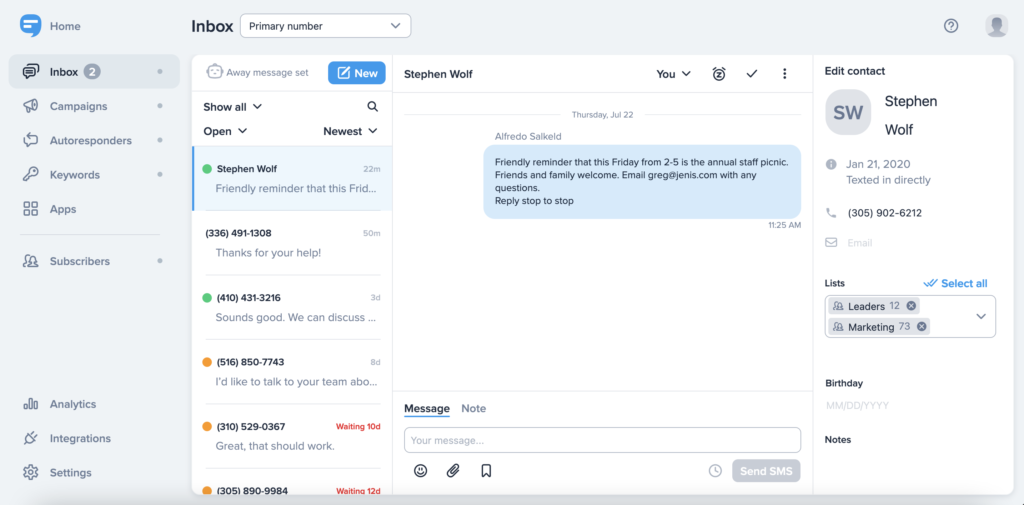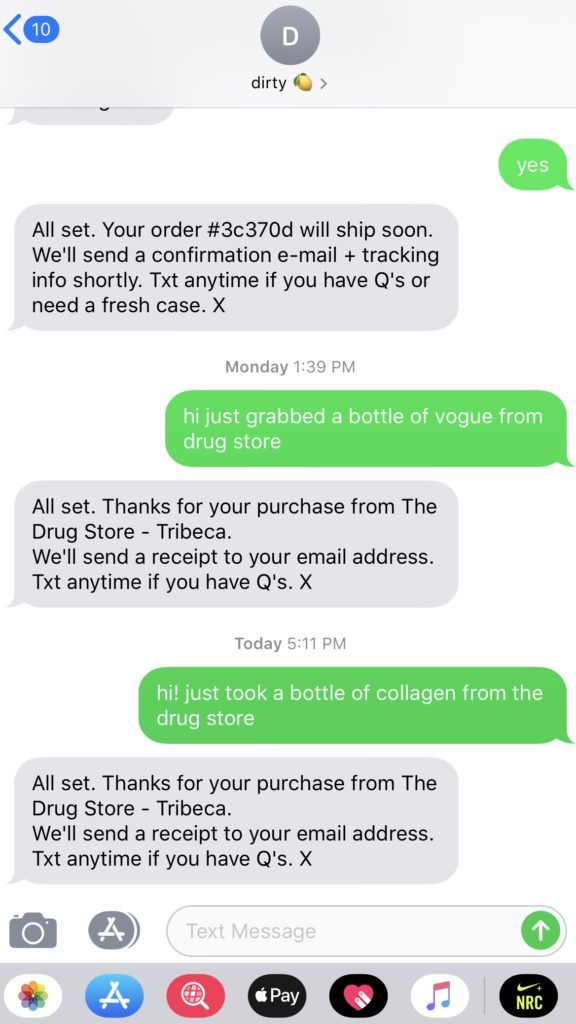The Beginner’s Guide to Conversational Customer Engagement
How we’ve been taught to market and sell no longer aligns with how buyers buy things. It's why you need a conversational customer engagement strategy.

How we’ve been taught to market and sell no longer aligns with how buyers buy things. It's why you need a conversational customer engagement strategy.

If you’ve ever eaten below-average food at a restaurant but still tipped the attentive waitress, you understand the importance of great customer service.
In the age of 24/7 communication, customers want to feel seen and heard by the companies they regularly interact with.
This need for authenticity and speed has shifted the focus of customer service away from formalities and into conversations on our favorite messaging apps.
Customers want to trust the brand they’re buying from and conversational customer engagement is all about building that relationship.
Conversational customer engagement is a strategy that encourages the customer to take part in personalized conversations.
This could be talking to an agent through a chatbox or having a text conversation with a customer service team member. The key is offering customers the opportunity to talk with ‘the brand’, allowing them to have their questions answered.
The benefit of these conversations is twofold. Not only is the customer more likely to receive the exact service or product they’re looking for, but they will also trust the brand to deliver it again and again.
Rather than a top-of-funnel strategy, conversational customer engagement is about turning a one-time customer into a returning one, or turning intent-to-buy into a purchase.
The former is particularly important: a 2% increase in customer retention will have the same impact as reducing operational costs by 10%, so it’s worth investing in.
You may have heard the phrase conversational commerce or conversational marketing thrown around in recent years too.
The term ‘conversational commerce’ was coined by the inventor of the hashtag, Chris Messina, in 2015.
Its name is the umbrella term for using conversational techniques in commerce and can vary from companies using Facebook messenger to conversational AI to website chatbots. Messina was one of the first to recognize the shift towards conversation-driven purchasing.
Conversational customer engagement and conversational marketing both come under conversational commerce. The latter focuses on top of the funnel lead generation through sparking conversations and opening discussions around products or services.
Once the customer has entered the funnel, conversational customer engagement is used to turn their interest into a purchase.
One of the most effective conversational customer engagement methods is texting.
Smartphones accounted for 69% of Shopify purchases in 2019, while 55% of consumers have brought products after seeing them on social media, making SMS a natural starting point to interact with customers.
Having an ‘Ask us a question!’ button is a quick and easy way to connect SMS with your website visitors.

From the customer’s end, all they need to do is click on this button to open up their native text messaging app with the phone number already prefilled.
Having their questions answered quickly and on through their preferred channel is a sure way to ensure they make a purchasing decision in your favor.
On your end, sending messages to multiple customers may sound like a difficult task, but it doesn’t have to be.
When you sign up to a business text messaging service, you have tons of SMS inbox features that enable you to manage multiple conversations at once.
Every text message will be sent to your unique phone number, so you can reply to customer needs and build that all-important relationship.

If you’re a bigger team, you can even take it one step further and add multiple teammates to share the workload and allow multiple customer service agents to answer questions.
It’s great to have an understanding of conversational customer engagement, but how about some real-life examples?
In other words, does conversational customer engagement really work for brands?
According to Bohemian Guitars, they noticed a jump in sales directly from mobile after investing in conversational SMS. Since April last year, there’s been 98% growth in the number of sales, which co-founder, Shaun Lee, attributes to their SMS efforts.
Shaun asked 500.co, “How many people do you text who you don’t know? As you respond to a customer on text, you’re much more informal. You instantly make a personal connection. When you make that personal connection, people are much more inclined to follow through with a purchase.”
Wellness brand Dirty Lemon, takes conversational commerce even further, offering the ability to purchase via text message.

When customers create an account on their website, their card number is linked to their phone number, and the service is text-to-order.
One of the biggest assets for using SMS to interact with customers is the insight it provides on purchasing habits. Not only does this provide the company with invaluable information, but it also offers customers a more personalized experience.
“Imagine if Coca-Cola had a profile on every person who has purchased Diet Coke over the last 30 years. They would be able to create a new product to sell to the consumers that they’re now losing – the people that used to drink Diet Coke but aren’t drinking it anymore,” Founder Zak Normandin told the Financial Times.
The need for transparent conversations and building online relationships has only grown in recent years.
With the continued rise of online shopping, it’s clear that customers are looking to spend online without giving up the customer service experience available in stores.
As brands continue to move online, it’s clear we’re looking at a future of conversational customer engagement being a major force in purchasing habits.
Alice is a copywriter at SimpleTexting. When not teaching the world about the benefits of business texting, you can find her feeding family, friends and strangers with her latest baking experiment.
More Posts from Alice DoddChoosing the best CRM for texting can be a challenge. In this simple guide, you’ll learn how to pick the right SMS-based CRM to manage your customers and SMS messages.
ReadIf you want a true multi-channel customer service offering, then you need to support text messaging. Here are some ideas on how your call center can get started.
ReadStart a text marketing campaign or have a 1-on-1 conversation today. It's risk free. Sign up for a free 14-day trial today to see SimpleTexting in action.
No credit card required